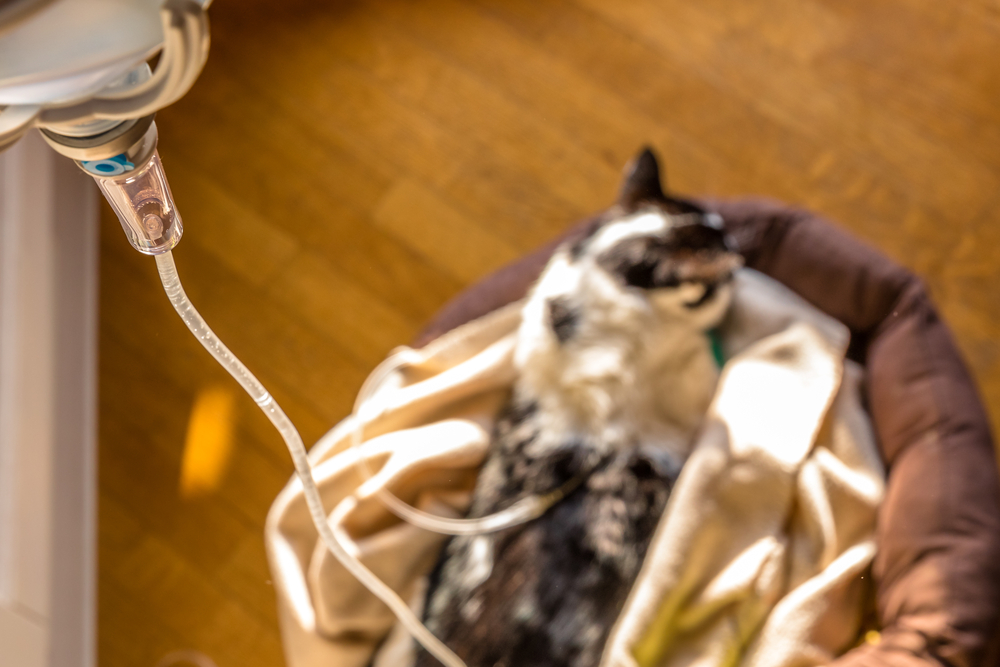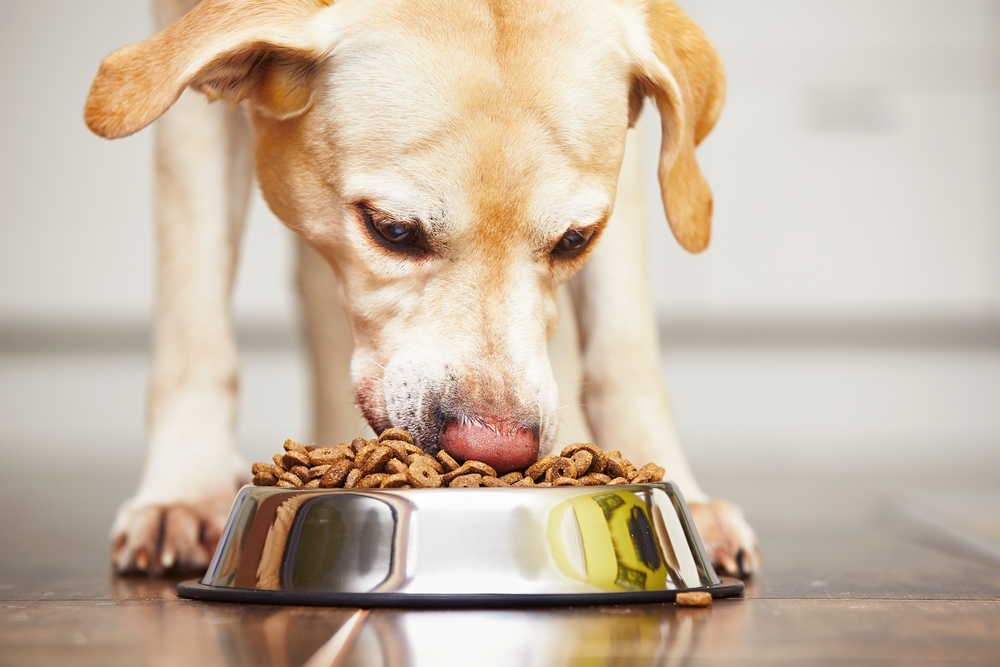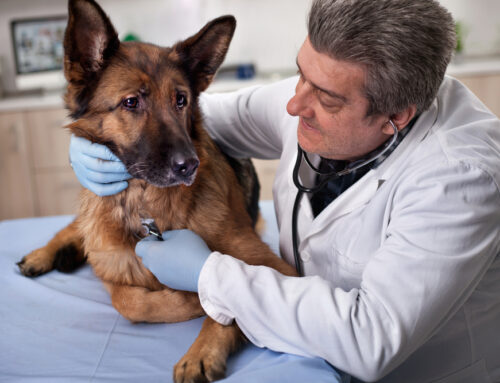If your pet indulges in a high-fat meal, they could develop pancreatitis, a painful condition that can make your four-legged friend extremely ill. To learn about pets’ pancreatitis, read our Guam Pet Hospital team’s guide to this condition.
A healthy pancreas in pets
The pancreas is a glandular organ that lies under the stomach along the small intestine’s first portion. The pancreas has two jobs:
- Digestive enzymes — The pancreas produces powerful digestive enzymes that are secreted into the small intestine to help digest dietary fats, proteins, and carbohydrates. The enzymes are normally safely stored in an inactive state inside pancreatic granules until they enter the intestine.
- Hormones — The pancreas also produces insulin and glucagon, hormones that regulate how the body uses ingested nutrients.
Pancreatitis in pets
If your pet develops pancreatitis, the digestive enzymes that the organ produces activate prematurely, damaging the pancreas and surrounding tissues, including the liver. Severely damaged tissues release toxins that can cause inflammation throughout an affected pet’s body, potentially leading to one or more of these issues:
- Disseminated intravascular coagulation (DIC) — Pancreatitis can trigger DIC, a dangerous condition that causes abnormal bleeding throughout the body.
- Diabetes mellitus — If the insulin-creating part of the pancreas is significantly damaged, this can lead to temporary or permanent diabetes mellitus.
- Pancreatic abscess — A pancreatic abscess can form, leading to peritonitis, a severe abdominal cavity infection.
- Weber-Christian syndrome — Lipase is the digestive enzyme that breaks down dietary fats. If your pet has pancreatitis, lipase can disseminate throughout their body and break down fatty tissue in the subcutaneous fat, creating painful lesions.
- Pancreatic encephalopathy — If the digestive enzymes damage the fats protecting the central nervous system, brain damage can occur.
Pancreatitis causes in pets
Your pet can develop pancreatitis for a number of reasons. In many cases, the inciting cause cannot be identified, but potential triggers include:
- A high-fat meal — Ingesting a high-fat meal can stimulate a large lipase release, leading to pancreatitis.
- Toxoplasmosis — Toxoplasmosis has been associated with cats’ pancreatitis.
- Metabolic abnormalities — Pets with conditions, such as diabetes and hypothyroidism, have an increased pancreatitis risk.
- Obesity — Obesity alters a pet’s fat metabolism, which can trigger pancreatitis.
- Medications — Certain medications, such as sulfa-containing antibiotics, chemotherapy agents, and antiseizure drugs, can increase a pet’s pancreatitis risk.
- Trauma — Severe trauma, such as being hit by a car, can trigger pancreatitis.
- Tumor — A pancreatic tumor can cause inflammation and lead to pancreatitis.
- Breed — Certain breeds, such as the miniature schnauzer, are predisposed to developing pancreatitis.
Pancreatitis signs in pets
Pancreatitis can be an acute (i.e., sudden onset) or a chronic illness. Depending on the condition’s presentation, pets’ pancreatitis signs vary:
- Acute pancreatitis signs — Pets who have acute pancreatitis are extremely ill. Signs include severe lethargy, abdominal pain, persistent vomiting, diarrhea, fever, severe dehydration, collapse, and potentially shock.
- Chronic pancreatitis signs — Pets who have chronic pancreatitis exhibit signs that include lethargy, decreased appetite or inappetence, and occasional vomiting. Pets who have chronic pancreatitis can have acute episodes.
Pancreatitis diagnosis in pets
If our Guam Pet Hospital team suspects your four-legged friend has pancreatitis, we will recommend several diagnostic tests. We may perform the following tests:
- Blood work — Routine blood tests, such as a complete blood count (CBC) and biochemistry profile, are useful to evaluate your pet’s overall health and rule out other potential conditions.
- X-rays — X-rays usually can’t detect pancreatitis, but we may X-ray your pet to ensure they do not have a foreign body gastrointestinal (GI) obstruction.
- Amylase and lipase levels — Increased digestive enzyme levels indicate pancreatitis. However, these tests aren’t sensitive or specific enough to diagnose the condition definitively.
- Pancreatic lipase immunoreactivity (PLI) — The PLI test measures only lipase released by the pancreas, making it a more accurate pancreatitis test. Often, however, this test does not provide results promptly enough to help a severely sick pet.
- Specific canine pancreatic lipase (SPEC cPL) — The SPEC cPL is an immunological test for canine pancreatic lipase that can usually be run in house in as few as 30 minutes.
- Ultrasound — Ultrasound is the best way to observe pancreatic abnormalities. However, changes may not be visible until extensive damage has occurred.
Pancreatitis treatment in pets 
Treatment for pancreatitis focuses on supportive care. Once a pet recovers from pancreatitis, they must remain on a bland, low-fat diet for several weeks, and many benefit from continuing a fat-restricted diet throughout their life. If your pet has acute pancreatitis, our team will typically hospitalize them, and provide treatment strategies that may include:
- Intravenous (IV) fluid therapy — Intensive IV hydration is necessary to correct fluid losses and electrolyte imbalances.
- Pain management — Pancreatitis is a painful condition, and our team typically prescribes medications to alleviate a pet’s discomfort.
- Nutritional support — Feeding tubes are often needed to provide adequate nutritional support.
- Antibiotics — If a pancreatic abscess develops or GI bacteria enter the bloodstream, antibiotics may be needed.
- Antinausea medication — To help an ill pet regain their appetite as soon as possible, our team will prescribe medications to control vomiting.
- Stomach protectants — We may also prescribe stomach protectants such as antacids.
Rapid diagnosis and treatment are critical when your pet has pancreatitis. If your four-legged friend is exhibiting signs that indicate they have this concerning condition, immediately contact our Guam Pet Hospital team, so we can provide the care they need.








Leave A Comment